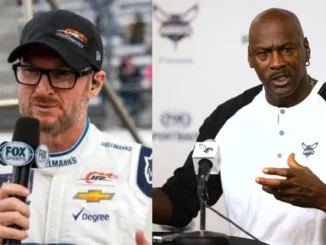Dale Earnhardt Jr.’s Retirement Decision: A Tough Call, But Necessary?
Dale Earnhardt Jr.’s decision to retire from full-time racing at the end of the 2017 NASCAR season shocked many fans and pundits alike. As the son of the legendary Dale Earnhardt Sr., Junior carried the weight of family legacy on his shoulders, with high expectations both on and off the track. But his retirement wasn’t just about a career decision—it was about health, legacy, and what was best for his future. However, for some, it felt like the worst decision, especially given his popularity and potential for future success.
### The End of an Era
Dale Earnhardt Jr. is one of the most iconic figures in NASCAR. His last race in 2017 marked the end of an era for fans of the sport. Junior had been a central figure in NASCAR for over two decades, known not only for his racing talent but also for his personality, his connection to fans, and his role in driving the sport’s popularity during its peak years.
By the time he made his retirement announcement, Earnhardt Jr. had already achieved remarkable success. He won two Daytona 500 titles, earned 26 Cup Series wins, and built a loyal fanbase. He was beloved not only for his racing skills but also for his humble, approachable demeanor. As one of NASCAR’s most marketable stars, his departure left a void that would be hard to fill. The question many fans and analysts had was: Why walk away now, when it seemed like he still had some good years ahead?
### Health Concerns and Safety
At the core of Earnhardt Jr.’s decision to retire was his health. Over the previous seasons, Junior had been plagued with a series of concussions, some of which were career-threatening. After a significant crash at Michigan International Speedway in 2016, Earnhardt Jr. was sidelined for half of the season due to concussion-related symptoms. The toll on his body, especially his head, was considerable.
Given the dangerous nature of racing and the ongoing concerns about the long-term effects of concussions, especially with the growing awareness around traumatic brain injuries in sports, Earnhardt Jr. took his health seriously. His decision to retire wasn’t just about walking away from the sport—it was about prioritizing his well-being.
For many, though, this was seen as the “worst decision” because they felt Junior had more to give on the track. He was still competitive, still had the drive, and still had a following. It seemed premature to leave at a time when he could’ve continued to be a strong presence in NASCAR. Yet, the risk of continuing to race, given the head injuries he had suffered, made the decision understandable.
### Legacy and Family
The pressure to live up to the Earnhardt family legacy was immense. Dale Earnhardt Sr. was an iconic figure in NASCAR, and Junior’s success on the track had often been measured against the backdrop of his father’s legendary career. For many fans, Junior could never quite escape the shadow of his father, regardless of his own accomplishments. Some critics even argued that he had not achieved as much as his father had, especially when it came to championships.
This created a sense of urgency for Dale Jr. to establish his own legacy, free from the expectations of being “the son of the Intimidator.” However, his health struggles, combined with his growing commitments outside the racetrack, made it clear that his priorities were shifting. At the time of his retirement, Junior had already begun to take on significant roles as an analyst and commentator, appearing on broadcasts and expanding his personal brand. He was also involved in business ventures and charitable causes. These outside interests, paired with his health concerns, made his retirement more of a natural progression than an abrupt ending.
### The “Worst Decision”?
For many fans, the retirement felt like the worst decision because they felt that Junior still had a lot of potential on the track. Despite not winning a championship during his career, Dale Jr. remained one of the most popular drivers in NASCAR history, with legions of fans who were devastated to see him leave. He had a strong connection to the sport, and his presence was seen as a stabilizing force during NASCAR’s transition from its peak popularity.
However, looking at the bigger picture, his decision to retire may not have been a “worst” decision at all. While it may have disappointed many, Junior’s choice was likely the wisest for his long-term health and happiness. The sport will always be there, but health is something you cannot get back. And as we’ve seen with other athletes who’ve suffered from concussion-related injuries, the consequences of pushing past the limits can be severe. In hindsight, it’s clear that his health had to come first, and in that regard, his decision was a responsible one.
### Conclusion
Dale Earnhardt Jr.’s decision to retire may have been tough to swallow for fans and analysts alike, but it was ultimately a decision made with his health, his future, and his family in mind. While it could be seen as the “worst decision” by those who wanted to see him race longer, it was the right call for his well-being. NASCAR lost one of its most iconic stars, but Junior’s legacy remains intact—both on the track and off.


Be the first to comment